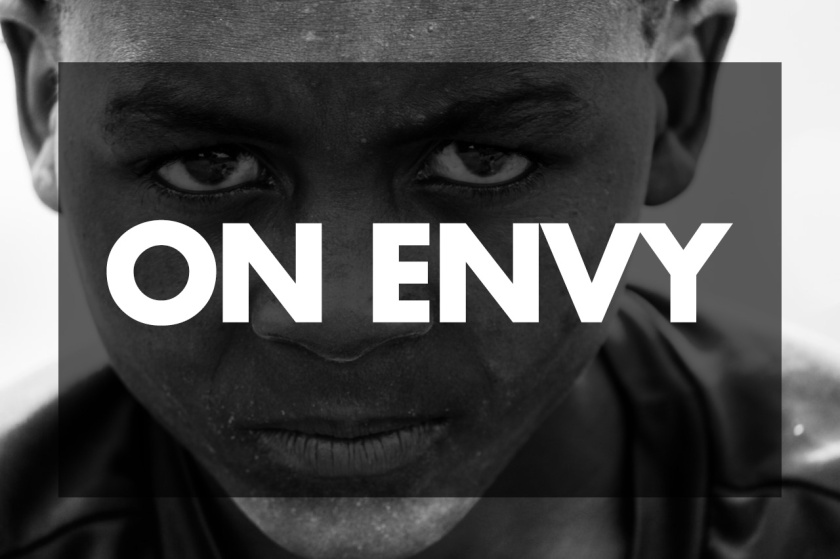
“Nothing in this world can so violently distort a man’s judgment than the sight of his neighbour getting rich.” — J.P. Morgan
I’m a horrible person.
The other day I was scrolling through Facebook (not because I needed to know to what my friends were up to, but to entertain myself out of my boredom.)
I saw my friends celebrating their successes, some are travelling around Europe.
Did it make me admire them?
No.
I envied them. I was jealous.
And quickly I moved to look at my other friends who I deem to have a more ordinary life or at least one that looks less desirable than mine.
But I always catch myself and ask: Why am I feeling this way? Where does this come from?
With this, I started looking for answers and I can’t help but share what I found. Enjoy.
Envy Makes You (Very) Irrational
Back in 1995, researchers from Harvard asked students/staff which they preferred:
- Earning $75,000 a year when everyone else around them makes $100,000.
- Earning $50,000 a year when everyone else around them makes $25,000.
Prices of goods and services would be the same in both cases. So a higher salary really meant being able to own a nicer home or a nicer car.
50% chose option 2, leaving $25,000 on the table, just to avoid earning less than their neighbours.
This makes absolutely no sense, but it is an accurate determinant as to whether one measures their success only to themselves or relative to others. It is nothing more than social comparison.
Think about it – much of our self-definition comes from comparison with others. We can’t define ourselves as great singers, if there is no one else around who sings worse than we do. Qualities like intelligence, beauty and skills are relative and thus when we compare poorly in comparison to our peers, our self-esteem suffers.
We experience envy when the quality we feel inferior about threatens our self-concept. We may not even be aware that we are lacking a particular quality, but the object of our envy heightens our awareness of our deprivation.
For example: Do you feel envy when you see a great diver at the Olympics? Probably not, because, for most of us, success at diving isn’t a core part of our self-concept. But let’s say you were a competitive diver — might you feel a little envious if you saw someone much better than you competing at the Olympics? (Aristotle wrote about this long time ago – “We envy those who are near us in time, place, age or reputation.“)
Thus, envy of others is always a reflection of something we feel about ourselves. We’re not rich enough, or smart enough, or beautiful enough; we don’t have enough possessions, enough attention, enough success.
Envy Drives The World, Not Greed
“It’s not greed that drives the world, but envy.” — Warren Buffett
While ‘greed’ refers to an excessive desire to possess something, ‘envy’ is a desire to possess what the other person is possessing. And more often than not, greed is fueled by envy. A lot of times, we desire something simply because we see someone else enjoying it.
Everyone is here not just to make money, but to make more money than what the next person is making (the research earlier proves this). Comparison and competition is intense, creating a perfect recipe for envy.
Charlie Munger, Warren Buffett’s business partner, would go on to say:
“Envy has no upside. The idea of caring that someone is making money faster[than you are] is one of the deadly sins. Envy is a really stupid sin because it’s the only one you could never possibly have any fun at. There’s a lot of pain and no fun. Why would you want to get on the trolley?”
While a small pinch of envy is a positive motivator, a chronic comparison complex can ruin your life. If you cannot control the ancient urge to measure your success against that of your peers, your happiness will always depend less on how much money you have than on how much money they have. And that’s something you will never have any control over.
Two Types of Envy
It has been said that there are two types of envy – a good type and a bad type.
The first type is the feeling of inferiority that motivates a person to improve herself. This bias exerts its influence by framing the success of others as a learning opportunity for ourselves. It serves to inspire us to do more and be more than our current standing. Our envy leads us to imitate that hero in a quest for self-improvement.
The other type, though, is malicious envy, which motivates the envious to take good things away from others. To the malicious envier, ridding oneself of envy requires taking away from the other — the beautiful car or house should be stolen or damaged, the virtuous person corrupted or killed and the beautiful face of someone ruined or covered. The malicious envier believes that those things should be his rather than theirs. He, after all, deserves it more.
How to Deal With Envy
An important question remains: How should we deal with envy at a personal level?
The tip I’ve found the most effective comes from Naval Ravikant.
In his interview with Farnam Street, he said that when he was young, he grew up a poor kid.
He would be envious of his peers on the other side of the field living much better lives. This went onto his late twenties where despite he was making a lot of money, he was still constantly envious of those above him.
But then, he figured out something that gave him peace of mind. It was:
“You can’t cherry pick the things you envy so much about the other person. You would have to take a 180 degree swap with that person. (You would have to take her age, her family history, her struggles, her failures, her medical conditions, her pains, her parents, her friends, everything. And lose everything you have built and leave everyone you love behind.) And unless you are totally comfortable with that swap, you shouldn’t be envious.”
After all, it was their experience that shaped their lives.
In Closing
“Enjoy your own life without comparing it with that of another.” – Nicolas de Condorcet
Envy is a real pain in the ass that we deal with on a daily basis. It’s one of the main reasons I have avoided my news feeds on Facebook and Instagram. But I guess only time will tell before I’m fully comfortable accepting where I am and stop comparing myself to other people’s lives.
While I know, you can’t remove envy out of your life overnight, you can at least be aware of it when it happens and question your emotions.
***
I once heard somewhere before that happiness is wanting what you have. And I think that is a good place to start.
And in case you’re wondering how you can avoid being the source of envy for others? Aristotle had an answer: “The best way to avoid envy is to deserve the success you get.”
***
Reference:
Mental Model: Bias from Envy and Jealousy by Farnam Street








